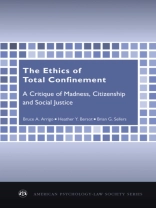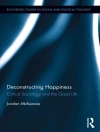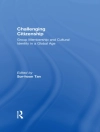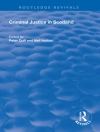In three parts, this volume in the AP-LS series explores the phenomena of captivity and risk management, guided and informed by the theory, method, and policy of psychological jurisprudence. The authors present a controversial thesis that demonstrates how the forces of captivity and risk management are sustained by several interdependent "conditions of control." These conditions impose barriers to justice and set limits on citizenship for one and all. Situated at the nexus of political/social theory, mental health law and jurisprudential ethics, the book examines and critiques constructs such as offenders and victims; self and society; therapeutic and restorative; health; harm; and community. So, too, are three "total confinement" case law data sets on which this analysis is based. The volume stands alone in its efforts to systematically "diagnose" the moral reasoning lodged within prevailing judicial opinions that sustain captivity and risk management practices impacting: (1) the rights of juveniles found competent to stand criminal trial, the mentally ill placed in long-term disciplinary isolation, and sex offenders subjected to civil detention and community re-entry monitoring; (2) the often unmet needs of victims; and (3) the demands of an ordered society. Carefully balancing sophisticated insights with concrete and cutting-edge applications, the book concludes with a series of provocative, yet practical, recommendations for future research and meaningful reform within institutional practice, programming, and policy. The Ethics of Total Confinement is a thought-provoking and timely must-read for anyone interested in the ethical and legal issues regarding madness, citizenship, and social justice. "It has become clear that there is no criminological exit from embrace of degrading punishments and practices to which our increasingly distorted risk perception commits us. Instead, the path forward must run through a return to the ethical and psychological roots of security and justice. The Ethics of Total Confinement is a quantum step forward in defining and advancing that path."–Jonathan Simon , Adrian A. Kragen Professor of Law, Jurisprudence and Social Policy Program, UC Berkeley School of Law"This book boldly calls for a total transformation in the way the law deals with people who are confined because of their perceived depravity or dangerousness. It focuses on three outcast groups–juveniles tried as adults, people with mental illness subjected to hospitalization, and sex offenders committed as dangerous–and, based on an innovative analysis of the relevant caselaw and empirics, shows why current practices not only visit substantial harm on these people but also brutalize those who deprive them of liberty and damage the rest of us by feeding our basest, most uninformed fears. Relying on Aristotelian philosophy, therapeutic and restorative principles, and commonsense justice, the book persuasively argues that we must reorient the training and thinking of all major players in the system if our goal is to promote the maximum amount of human flourishing."–Christopher Slobogin, Milton Underwood Professor of Law, Vanderbilt University Law School"The Ethics of Total Confinement: A Critique of Madness, Citizenship, and Social Justice deepens our understanding of how our legal system justifies its treatment of those it confines. By bridging gaps among relevant disciplines, the book clarifies to an interdisciplinary audience just how inadequate those justifications turn out to be when measured by psychological, ethical, or justice-based standards. The book’s provocative conclusions and recommendations offer much food for thought and suggest potential directions for action."–Dennis Fox, Emeritus Associate Professor of Legal Studies and Psychology, University of Illinois at Springfield"The Ethics of Total Confinement shows how captivity diminishes the keepers and the kept. It is a book that synthesises in creative new ways reformist visions of justice, virtue and the cultivation of habits of character. This is profound work that opens new paths to dignity, healing and social justice."–John Braithwaite, Australian Research Council Federation Fellow, Australian National University"The Ethics of Total Confinement offers a useful and wide-ranging perspective grounded in psychological jurisprudence. With its emphasis on the harm done to those most vulnerable to extremes of risk-management, this volume makes a welcome addition to the literature on confinement."–Lorna Rhodes, Professor, Department of Anthropology, University of Washington"The provocative thesis of this book develops psychological jurisprudence to conceptualize the ethics of existing total confinement practices, aspiring to greater justice and human flourishing for all. A timely intervention of this kind is most welcome."–George Pavlich, Associate Vice-President (Research), Professor of Law and Sociology, University of Alberta
Bruce A. Arrigo & Heather Y. Bersot
Ethics of Total Confinement [PDF ebook]
A Critique of Madness, Citizenship, and Social Justice
Ethics of Total Confinement [PDF ebook]
A Critique of Madness, Citizenship, and Social Justice
Beli ebook ini dan dapatkan 1 lagi PERCUMA!
Bahasa Inggeris ● Format PDF ● ISBN 9780199707164 ● Penerbit Oxford University Press ● Diterbitkan 2011 ● Muat turun 6 kali ● Mata wang EUR ● ID 2280506 ● Salin perlindungan Adobe DRM
Memerlukan pembaca ebook yang mampu DRM












